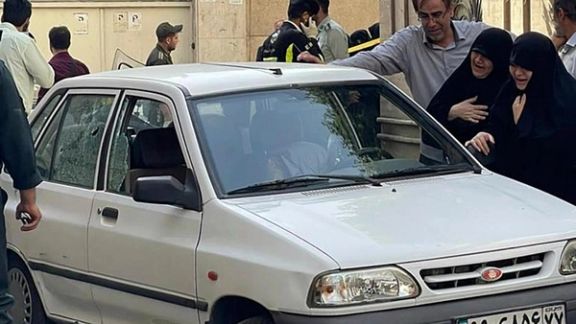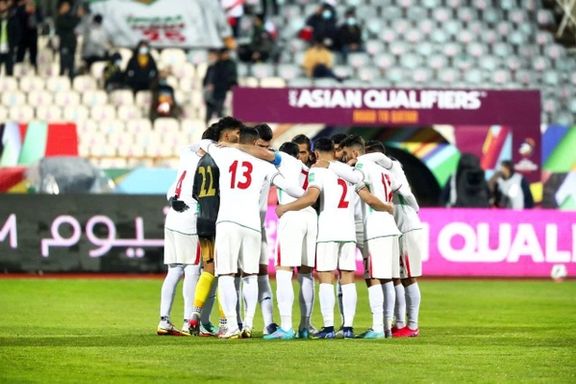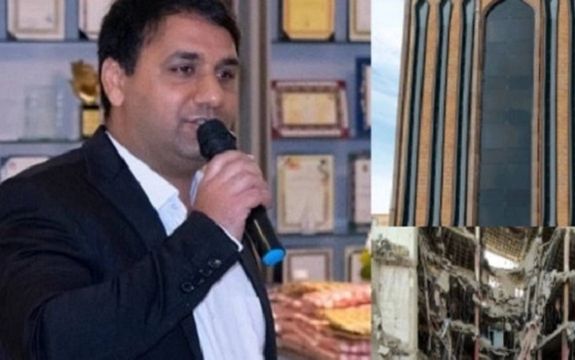Canada Soccer Cancels June Match With Iran After Protests

Canada Soccer has cancelled a controversial friendly match with Iran’s national team after many Iranians objected to the visit of Iranian football officials.

Canada Soccer has cancelled a controversial friendly match with Iran’s national team after many Iranians objected to the visit of Iranian football officials.
The match planned to take place in Vancouver on June 5 was part of the Canadian men’s team’s preparation for World Cup in Qatar later this year.
Earlier in May as news emerged that Iranian football officials with ties to the country’s Revolutionary Guard (IRGC) were to accompany the team, many Canadian-Iranians launched campaigns to cancel the match.
At the forefront of the movement were families of victims who died when the IRGC shot down a Ukrainian airliner over Tehran in January 2020, killing all 176 onboard.
Hamed Esmaeilion, the chief spokesperson for the Association of Families of Flight PS752 Victims, in an opinion piece for Canada’s Globe and Mail last week said that soccer in Iran is controlled by the IRGC, which is expected to send members to accompany the Iranian team and said it is shocking that Canada Soccer is inviting the Iranian national team.
Later, a photo emerged showing the Iranian team’s manager Hamid Estili with a man in Tehran in April who is wanted by the US Federal Bureau of Investigation for involvement in an alleged kidnapping plot of a New York-based Iranian activist.
The decision by Canada Soccer will be seen as a victory by Iranian human rights activists who have become much more vocal and effective in Europe and North America in recent years.

The New York Times has quoted an Israeli intelligence official as saying that Tel Aviv has informed American officials it was responsible for the killing of a Revolutionary Guard colonel in Tehran.
In an article published on Wednesday, the daily said according to an intelligence official, Israel has informed American officials that it was behind the killing of Hassan Sayyad-Khodaei -- a member of IRGC’ Quds Force, responsible for operations outside Iran’s borders.
The intelligence official, who spoke on the condition of anonymity, said the Israelis killed him as a warning to Iran to halt the operations of a covert group within the Quds Force known as Unit 840, tasked with abductions and assassinations of foreigners around the world, including Israeli civilians and officials.
According to the article, Khodaei was the deputy commander of Unit 840 and in charge of its operations in the Middle East and countries neighboring Iran. Over the past two years, he had also been involved in attempted terrorist attacks against Israelis, Europeans and American civilians and government officials in Columbia, Kenya, Ethiopia, the United Arab Emirates, and Cyprus.
A European security official, told Iran International on Tuesday that Khodaei was responsible for a number of terrorist operations against Israelis in three continents of Asia, Europe, and Africa, including an attack in the Indian capital New Delhi on February 13, 2012.
Khodaei was killed outside his home on a residential street in Tehran on Sunday when two gunmen on motorcycles approached his car and fired five bullets at him. Iran blamed Israel and vowed revenge for the killing.

Tehran and Moscow have signed a number of major memoranda of understanding (MoUs) to expand energy and trade ties, as Russian Deputy Prime Minister Alexander Novak visited Iran.
The agreements were signed in Tehran on Wednesday during a meeting attended by Novak and Iranian Oil Minister Javad Owji.
"Iran and Russia are both under oppressive sanctions, which, God willing, can be neutralized by working together and developing relations in various fields," Owji was quoted as saying by the oil ministry’s news agency, Shana.
"Good agreements were reached in the fields of rail, road transport, shipping and aviation," he said, without expanding further, adding that both sides have "good capacities for cooperation in energy, banking, transportation, agriculture, nuclear energy, industry and trade".
"We plan to increase the level of Iran-Russia trade relations in these fields to $40 billion a year," the oil minister added. Current annual bilateral trade is around $4 billion.
According to Russia's Interfax news agency Novak and Owji discussed the potential for oil and gas swaps, as well as "increasing joint investments in oil and gas projects" with the Russian official emphasizing that "Energy is one of the most important sectors of our trade and economic cooperation."
"We agreed to switch over to the use of national currencies as much as possible," Novak added, noting that "A path is being pursued to increasing trade, economic, logistics, investment, financial and banking cooperation, despite the unprecedented pressure that Russia is currently experiencing from unfriendly countries."
While Tehran has been chafing under sanctions for years, especially after the US pulled out of the nuclear deal in 2018, Western governments have imposed tough sanctions on Russia after it invaded Ukraine in February.

All schools, universities, and businesses in Tehran and other cities of the province were closed Wednesday, some for the second day, due to air pollution.
Tehran Governor Mohsen Mansouri announced the measure following a decision by the Tehran Province Air Pollution Emergency Committee. The neighboring province of Alborz, the southern province of Khuzestan, East Azarbaijan province in the north west, and Esfahan province in central Iran also reported shut-downs due to air pollution including severe sandstorms.
The air quality index in many Iranian cities, including Tehran and Kermanshah, has reached a maximum level, making it hazardous for people to leave their homes. While Tehran’s air is among the world’s most polluted, many large Iranian cities face similar problems, especially when power stations use heavy diesel fuels as demand for electricity runs ahead of the supply of natural gas.
Dust storms, originating in both Iran and neighboring countries, have also increased markedly in recent years in several Iranian provinces, notably Khuzestan, Kermanshah, and Sistan-Baluchestan. While there have been efforts to reduce such storms through more effective management of water resources and planting drought-resistant trees in arid areas, these have so far proved inadequate.

The Canadian government has told Iran International that all visitors are carefully screened before entering Canada, dodging a direct response whether the Iranian football team will be allowed in the country.
In response to an inquiry by Iran International Tuesday, Canada’s Immigration, Refugees and Citizenship department (IRCC) said it is committed to the fair and robust application of immigration procedures and also to the safety and security of the Canadian public. But Fars News Agency, affiliated with the Revolutionary Guards, said on Wednesday that the match between Canada and Iran is on the verge of cancellation as Iranian players may not be able to obtain visas to enter Canada.
“All visitors to Canada from visa-required countries must meet the visa eligibility requirements" the IRCC said, adding, “background screening is an important part of the overall assessment of whether a person is admissible to Canada.”
The Iranian national soccer team’s manager Hamid Estili, who is going to Canada for the controversial friendly next month, recently attended a party with Mahmoud Khazein, who is wanted by the FBI in relation to a plot to kidnap international targets, including three people in Canada.
On Tuesday, Prime Minister Justin Trudeau reiterated his belief it was a "bad idea" to host the game but said ultimately it is not his decision about whether it will be allowed to go ahead.
The match has angered those who lost loved ones in Iran’s downing of Flight PS752 in 2020, and are demanding that Canada Soccer abandon its plan for the game, saying they feel "betrayed" by the decision to have the Iranian team in British Colombia, a sentiment the prime minister said he shares.

A journalist in Iran has accused authorities of covering up the escape of the owner of a building that collapsed in Abadan Monday, and claiming that he is dead.
The Iranian Red Crescent has reported eleven deaths and warned about the collapse of the rest of the building. So far 39 have been pulled from the rubble alive. Rescue operations cintinued Tuesday as there were as many as 50 people buried under the rubble. Three rescue workers were injured on Tuesday when another part of the building collapsed.
Saeed Hafezi, a journalist and whistle-blower, claims that Hossein Abdolbaghi, owner of one of the ten-story Metropol twin towers which collapsed Monday, was seen leaving the building half an hour before it collapsed, and authorities are lying about his death in the accident. Hafezi says he has personally spoken to a witness.
Radio Goosheh Kenar, a local internet radio station run by Hafezi, on Tuesday published an audio file sent by a man claiming to be an employee of the Abadan coroner’s office who claims officials of the coroner’s office were pressured by unidentified authorities to issue a death certificate in Abdolbaghi’s name for an unidentifiable body they brought in. The man whose voice was altered in the recording says the coroner’s office has so far not relented to outside pressure and declined to issue a death certificate.

Initially, suspicions arose right after the collapse of the building on Monday when media, including the official news agency (IRNA), reported Abdolbaghi’s arrest but on Tuesday prosecutor general of Khuzestan province, Sadegh Jafari-Chegeni, told the judiciary’s news agency, Mizan News, that he died in the incident. Abdolbaghi’s identity papers were discovered on a very badly damaged and unidentifiable body in the rubble, he said, and the body was eventually identified as belonging to him, officials claimed, without saying who made the identification.
A photo taken from CCTV footage in the area has also been circulating on social media allegedly showing Abdolbaghi running away after the incident. Dariush Memar, a journalist currently residing in London, in a tweet Monday said he had met Abdolbaghi in Iran many times and he can confirm that the man in the photo is highly likely to be him, “unless a photo of his body is shown at the coroner’s office by the justice department of Abadan.”
Abdolbaghi, 40, is a well-known entrepreneur in Khuzestan with alleged strong connections with influential officials and centers of power. In 2018 the ministry of industries, mines and trade named him as the top entrepreneur of the Arvand Free Zone in Khuzestan.
In an article published in August 2020 in Feydus, an Iranian news website, Memar accused Abdolbaghi of corruption. “His formula for amassing wealth, like many others in Iran today, is very simple: Clever management of connections and opportunities based on rente.” ‘Rente’ is a French word used in Persian to imply privileges resulting from undue influence.
He also had close connections with the police and security forces who once gave an award.
The head of Iran’s Construction Engineering Organization, Hamzeh Shakib, on Monday said adding three extra stories to the original plan built illegally had caused the tragedy of the building’s collapse. He also said the organization had several times reported critical faults in the construction of the building, including in their most recent report, but the municipality of Abadan which was responsible for stopping the construction ignored the warnings.
Authorities say they have arrested ten officials including the current mayor of Abadan and two former mayors, for negligence leading to the tragedy of the building’s collapse.